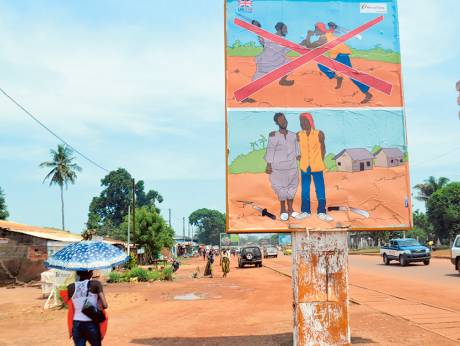
By: AFP
Source: Gulf News Africa
Bangui, Central African Republic: “Let Us Reconcile” implores a banner on a statue at the entrance to the main market in Bangui, in a Muslim neighbourhood that gave refuge to people fleeing religious strife that swept the Central African Republic.
The market was a thriving hub in the capital’s Kilometre Five district before a March 2013 coup that led to the first conflict directly pitting Christians against minority Muslims in a nation with a long history of unrest.
The bloodshed halted business and displaced scores of thousands of terrified people as successive waves of violence meant that nobody was safe in Bangui for many months.
“Back then, Kilometre 5 was the Alamo,” recalls a security specialist, referring to the 1836 siege by the Mexican army of a mission in Texas that ended in the slaughter of all the defenders.
Michel Djotodia, the country’s first Muslim president who was put in power by rebels in the immediate aftermath of the coup, stepped down in January 2014 under strong international pressure.
Though Djotodia had disbanded the armed Seleka coalition that backed him, many former rebels went rogue and carried out vicious attacks on Christian residents.
The atrocities provoked fierce reprisals by anti-balaka (anti-machete) forces from Christian communities, and fears of genocide sped up foreign military intervention.
Vigilantes massacred hundreds of Muslims and drove many to seek safety in Seleka-guarded KM-5, which is now patrolled by foreign peacekeeping troops.
“KM-5 is one of the most tightly secured places in the city of Bangui today,” said Public Security Minister Nicaise Samedi Karnou, for whom the district is an economic priority.
The gradual resumption of trade goes together with efforts to pacify the poor, landlocked nation, which has been prey to unrest since independence from France in 1960.
Customers consider it safe to come to the market and buy foods like cassava, rice, meat, flour and spices, along with clothes, pots and pans and cleaning products.
But business is still bad, says Adim Al Khalil, a 65-year-old palm oil vendor.
“We manage to eat every day,” he says. “No more than that.”
Two abandoned police stations are now manned again by national law enforcement officers, who work alongside African troops wearing the blue helmets of a UN mission, Minusca.
“I appreciate the Minusca patrols. They’re reassuring,” Al Khalil says.
Traders swap greetings with armed African soldiers riding by in their military vehicles.
But French peacekeepers receive a far frostier reception after a scandal broke last month over accusations of child rape involving at least 14 soldiers.
Some Muslims already resent France for allegedly abetting attacks by Christians.
“We don’t like the French,” Al Khalil says. “If only they had approached Muslims in a friendly way.”
Yet there are signs of reconciliation between the two faiths.
Eloge Bouteh, a Christian vendor of cotton swabs, is both neighbour and friend to Ali Uche, a Muslim who sells earrings.
“My big brother, my cousin and my grandmother died during the conflict, but Christians and Muslims are already together,” Bouteh says.
“We used not to get on, but now we’re starting to understand each other. During the events, we all fled to go home, but it’s calm now. People move around freely.”
Uche says he lost “my father, my mother, children [and] younger brothers,” but puts his country first, insisting that he is “Central African” like his friend.
“We can’t visit their districts,” Uche nevertheless warns. “If Muslims go the Christians, the Christians will kill them. They come to KM-5, but we don’t kill them.”
“Christians and Muslims, they’re all my customers, but today the market is dead” compared with the bustling place it once was, he adds.
Romanic Omagele, a 19-year-old driver, eats by a stall selling grilled mutton and goat, known as mechoui.
“This is good, it’s mechoui, it’s Muslim. I’m a Christian and I eat my brother’s food. It was politics that drove us apart.”



